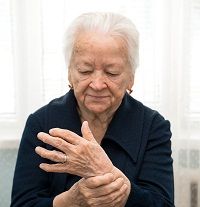Article
Mood Influences Pain Levels in Rheumatoid Arthritis
Author(s):
Study results show that mood, whether positive or negative, may impact the discomfort associated with rheumatoid arthritis.

Study results show that mood, whether positive or negative, may impact the discomfort associated with rheumatoid arthritis.
It has been long accepted that the painful symptoms of rheumatoid arthritis can lead to depression and other mental conditions. Researchers from The Pennsylvania State University (Penn State) analyzed how mood in the moment can influence the pain which many patients experience on a daily basis. Although patients in the rheumatoid arthritis population were studied, the findings may extend to other painful conditions.
“Although it is relatively common to hear people in everyday life acknowledging that their mood can exacerbate their physical pain,” study author Jennifer E. Graham-Engeland explained in a news release, “most evidence for this view is derived from cross-sectional comparisons, longitudinal associations over fairly lengthy periods of time, such as months or years, or laboratory studies where mood and/or pain are manipulated, as opposed to naturally occurring in everyday life.”
Previous studies measured pain levels at the end of the day; however, the latest analysis included 152 patients who used mobile devices to keep track of their pain and mood information five times per day for seven days. The report, published in the Annals of Behavioral Medicine, tracked pain, swelling, stiffness, and activity restrictions do to arthritis.
The results revealed that greater positive mood was linked with less pain and fewer restrictions. In conjunction with the association was the finding that a more negative mood tied to more arthritis-related restrictions. Furthermore, increased pain was found to be more prominent in those with greater depressive symptoms.
“The results of this study link momentary positive and negative mood with momentary pain in daily life,” said Graham-Engeland, an associate professor of biobehavioral health at Penn State. “That is, we found evidence consistent with a common, but largely untested, contention that mood in the moment is associated with fluctuation in pain and pain-related restrictions.”
Even though both positive and negative moods were found to influence pain levels, based on the data the researchers suspect that a positive mood is especially important.
“Several of our analyses suggest that momentary positive mood is more robustly associated with momentary pain than negative mood,” Graham Engeland confirmed.





